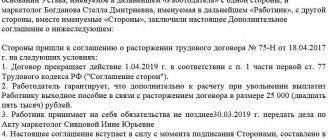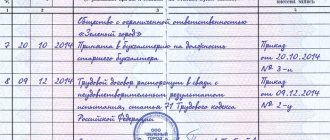The main part of the Armed Forces of the Russian Federation (RF Armed Forces) currently consists of professional military personnel who enter military service through voluntary concluding a contract. Such a contract is signed when filling positions at any level - privates, junior officers, officers - depending on the specialist’s level of education. In essence, such a contract is an analogue of an employment contract in civilian life, but more serious requirements are established for a military personnel. Violation of the terms of the contract on his part also leads to more serious consequences.
What is the dismissal of a military personnel according to the National Criminal Code?
The abbreviation NUK is usually deciphered as “failure to fulfill the terms of the contract.” This abbreviation is used in matters of military service and is based on the wording of the grounds for dismissal of a serviceman by decision of the command. In Federal Law No. 53-FZ of March 28, 1998 “On Military Duty and Military Service,” an exhaustive list of grounds for dismissal of military personnel is set out in Article 51. Paragraph 2 of this article establishes cases when a contract soldier can be dismissed from military service early. In particular, subparagraph “c” allows this “in connection with his failure to fulfill the terms of the contract.”
Dismissal under the National Criminal Code is one of the most serious measures of influence on a military personnel. This follows from the provisions of the Disciplinary Charter of the Armed Forces of the Russian Federation, where Article 54 establishes a list of types of disciplinary sanctions applied to all categories of military personnel. In this list, early dismissal from military service due to failure to fulfill the terms of the contract and equal penalties (not related to contract soldiers, such as expulsion from a military educational organization or military training) in terms of the conditional “degree of severity” are second only to disciplinary arrest.
Based on the provisions of the Disciplinary Charter, it is assumed that less stringent measures of influence before being presented for dismissal (including a reprimand, a severe reprimand, a warning about incomplete official compliance, demotion in position and military rank) must be exhausted or be insufficient. In relation to the dismissal of a serviceman for failure to comply with the terms of the contract, the basis may be circumstances that qualify the disciplinary offense committed as gross. Among them, according to Article 28.5 of the Federal Law of May 27, 1998 No. 76-FZ “On the status of military personnel”, the following:
- unauthorized leaving the place of duty;
- violation of statutory relationships between military personnel;
- failure to appear for duty on time without good reason;
- violation of the rules of service;
- evasion of official duties;
- illegal use or damage to military property carried out intentionally;
- damage to property or its destruction due to negligence;
- refusal to travel;
- violation by the commander of safety requirements, resulting in the death or disability of military personnel;
- violation of confidential records management requirements;
- violation of the procedure for traveling outside the Russian Federation.
Dismissal under the National Criminal Code is also carried out for an administrative violation or crime committed by him. Since their list is not established in the legislation, each of them is considered individually. The main criterion in this case is that the consequences or nature of the offense are incompatible with continued status as a Russian military serviceman.
It will be important to clarify that the text of contracts concluded with military personnel of the Ministry of Defense of the Russian Federation only states the citizen’s obligation to perform military service during the period established by the contract, to conscientiously perform all general, official and special duties of military personnel without specifying them - as “established by legislative and other regulatory legal acts of the Russian Federation".
This is exactly the wording contained in the Standard Form of a Contract for Military Service, approved as Appendix No. 1 to the Regulations on the Procedure for Military Service, and in the vast majority of contracts concluded in practice. It follows from this that non-compliance with the terms of the contract is the failure of the serviceman to fulfill the following duties:
- general - established by the general military regulations of the RF Armed Forces;
- official - determined by the military position being filled by a military personnel, as well as relevant manuals, instructions, regulations, instructions or orders of commanders (chiefs
- special - assigned to military personnel on combat duty (combat service), in daily and garrison duty, in cases of their involvement in eliminating the consequences of natural disasters, as well as in other emergency circumstances.
Thus, a contract soldier is obliged, first of all, to comply with the requirements of the Charter and laws governing service in the Armed Forces of the Russian Federation, and also to strictly carry out orders, except for those classified as illegal. Violation of such requirements on his part will be a guilty act, punishable in accordance with the norms of current legislation, including by dismissal for failure to comply with the terms of the contract.
Committing disciplinary offenses
Disciplinary offense
In order for the commander to make an appropriate decision, it will be enough to commit one offense that is considered gross.
A complete list of them is in the special Disciplinary Charter, which is drawn up separately for each part.
Or the basis may be the presence of several disciplinary sanctions.
The main thing is to record in writing that the military man has committed several offenses.
It is unacceptable to prosecute a person twice for the same violation, according to the text of the current legislation.
The procedure for dismissing a military personnel according to the NUC
The procedure for dismissal of military personnel is generally regulated by Federal Law No. 53-FZ “On Military Duty and Military Service,” as well as Article 34 of the Regulations on the Procedure for Military Service, approved by Decree of the President of the Russian Federation of September 16, 1999 No. 1237, and a number of departmental orders. The following have the right to early dismissal from military service due to failure to fulfill the terms of the contract in relation to their subordinates:
- For soldiers, sailors, sergeants and foremen - the commander of a military unit (regiment, ship of 1st rank).
- For ensigns and midshipmen - the commander of the army (flotilla).
- To officers from battalion commanders, their equals and below - deputy ministers of defense, commanders-in-chief of the branches of the Armed Forces of the Russian Federation and their equals, in addition to the rights granted to the commander of the troops of a military district, front, fleet and their equals.
According to Article 99 of the Disciplinary Charter of the Armed Forces of the Russian Federation, early dismissal from military service due to failure to fulfill the terms of the contract is applied to a serviceman performing military service under a contract for failure to fulfill the terms of the contract and is carried out without his consent.
If at the time of early dismissal the serviceman has not completed the established period of conscription military service, he is sent to perform conscription military service with two months of contract military service credited for one month of conscription military service.
In accordance with the norms of Article 81 of the Disciplinary Charter of the RF Armed Forces, the procedure for dismissing a military personnel under the NUK is as follows:
- Once a violation is detected, an investigation is carried out within 10 days.
- The serviceman's immediate commander submits a report to higher authorities for early termination of the contract.
- Based on the results of consideration of the report, a decision on dismissal is made and an order to terminate the contract is issued.
Article 81.1 of the Disciplinary Charter specifies that the total duration of the proceedings should not exceed 30 days from the moment when the commander (superior) became aware of the commission of a disciplinary offense by a serviceman, not counting the period of temporary incapacity for work of the serviceman, his stay on leave, and other cases of his absence from service for good reasons.
The immediate superior must initiate an extraordinary certification, which, according to the Resolution of the Constitutional Court of the Russian Federation No. 6-P dated March 21, 2013, is mandatory when deciding on the issue of early termination of a contract. When assigning certification, the following actions are required:
- formation of an attestation commission;
- notifying the serviceman about the inspection two weeks before it begins;
- establishment by the commission of facts of improper fulfillment of the terms of the contract, with the drawing up of an appropriate protocol;
- sending a proposal for early termination of the contract to a higher command, which makes its decision on this issue.
The certification procedure is carried out in the same way for both officers and other contract military personnel.
Consequences of dismissal under the NUC
This reason for dismissal is discriminatory, that is, it entails negative consequences for the serviceman. At the same time, the contract soldier is deprived of the opportunity to choose another, less problematic reason for his dismissal from the army, even if there is one (expiration of the contract, reaching the age limit for military service, recognition of the Military Military Commission as unfit for service for health reasons).
Due to the fact that dismissal from the army under the National Criminal Code is carried out on the basis of the guilty actions of the serviceman himself, the contract soldier is deprived of the right to receive a number of payments due to him upon dismissal on other grounds. Among them:
- severance pay, the amount of which ranges from two to seven monthly salaries, depending on length of service;
- bonuses for the performance of military duties;
- annually accrued financial assistance.
However, if the specified payments were received by the serviceman before the day of dismissal, then they are not subject to recovery due to early termination of the contract.
What will happen to the mortgage?
If a serviceman under a contract, dismissed under the National Criminal Code, is a participant in the savings-mortgage system (NIS), then in accordance with paragraph 2 of Article 15 of the Federal Law of August 20, 2004 No. 117-FZ “On the savings-mortgage system of housing provision for military personnel,” he will is obliged to return the amounts paid by the state under the targeted housing loan agreement. Repayment must be made in monthly installments over a period not exceeding ten years. In addition, amounts of money in the form of interest accrued on the amount of the outstanding balance from the date of dismissal are subject to payment.
If the former serviceman does not repay the specified debt, the Federal State Institution "Rosvoenipoteka" has the right to forcibly sell the housing that is pledged. The proceeds are used to pay existing debt, costs associated with the sale and legal fees. If after all the payments there is money left, it is given to the serviceman. If there are not enough funds from the sale, the dismissed contractor continues to remain a debtor and pays off the remaining debts on his own.
How will it affect your pension?
According to current legislation, someone dismissed from military service due to failure to fulfill the terms of the contract does not lose military service, as well as insurance service in general.
If there is 20 years of service or more, including in preferential terms, then a pension for length of service is assigned regardless of the grounds for dismissal, including according to the National Tax Code. There is only one exception: if, before the pension was granted, the serviceman was convicted of committing a crime and was deprived of his military rank by a court verdict.
The leadership of military units - what should be remembered
The commander (or chief) of the military personnel should not rashly use his right to dismiss subordinates for NUC. Not every violation committed is a reason for the complete removal of a military man from service.
All negative incidents must be considered on an individual basis. It is wise to study:
- Similar precedents, including those considered in the courts.
- Established practice in similar situations.
- Documents characterizing the personal qualities of a serviceman and his professional abilities.
Other consequences
Dismissal of a serviceman in connection with the NUK subsequently makes it impossible to re-enter a contract with the RF Armed Forces or enter service in law enforcement agencies (police, FSB, FSIN, etc.). It may also be impossible to fill a number of positions in state or municipal authorities. Even private security companies and large corporations currently have a negative attitude towards the employment of former contract workers dismissed under the NCA.
Dismissal under the NUC: judicial practice
The current judicial practice in matters of dismissal of military personnel is based mainly on Resolution of the Plenum of the Supreme Court of the Russian Federation No. 8 of May 29, 2014. Regarding early dismissal from military service due to failure to comply with the terms of the contract, it states that this basis can be applied to military personnel as a disciplinary sanction and in the certification procedure, taking into account the serviceman’s compliance with the requirements imposed on him.
Failure to fulfill the terms of the contract as a basis for the early dismissal of a serviceman from military service should be considered only significant (significant) deviations from the requirements of the legislation on military duty and military service, which can be expressed, in particular, in the commission of:
- guilty actions (inactions) indicating that the serviceman lacks the necessary qualities to properly perform the duties of military service;
- one of the gross disciplinary offenses, the elements of which are listed in paragraph 2 of Article 28.5 of the Federal Law “On the Status of Military Personnel”;
- disciplinary offense if he has outstanding disciplinary sanctions;
- a criminal offense or an administrative offense for which a military serviceman is liable on a general basis;
- other legally significant circumstances allowing, due to the specifics of the serviceman’s official activities, to conclude that he has ceased to meet the requirements of the legislation on military duty and military service imposed on military personnel performing military service under a contract.
If a serviceman, in terms of his business and personal qualities, does not meet the requirements for persons undergoing military service (which may be evidenced, for example, by the presence of outstanding disciplinary sanctions), his early dismissal from military service is possible only based on the results of certification, including extraordinary.
Is it possible to challenge?
According to the current legislation of the Russian Federation, a serviceman has the right to challenge dismissal for non-compliance with a contract - to appeal the results of certification. To do this, you should contact a military court or military prosecutor's office. Employees of these institutions will study the situation.
Appeal to the court is carried out in the manner established by the Federal laws of the state. The procedure for paying state fees for filing an application to a military court is carried out by the Government of the Russian Federation. However, the time limit for filing a lawsuit is limited. A military citizen has the right to appeal his dismissal within three months from the date of his exclusion from the personnel of the military unit where he previously served under contract.
Military contractors must proceed from the presumption of integrity and integrity of their superior officers. However, based primarily on practical experience, in no case should we forget about the unworthy behavior of officers who have the right to spontaneously dismiss a particular serviceman.
Any violations of disciplinary sanctions, organization and implementation of the certification procedure, early dismissal - all this should become the object of close attention. And the rights of contract military personnel are protected to the maximum extent possible.
What is the statute of limitations
A serviceman who considers himself innocent has the right to submit a complaint to the commander (superior) within 10 days from the date of application of the disciplinary sanction. This is established by Article 83 of the Disciplinary Charter of the RF Armed Forces, but in practice it is unlikely to be effective in case of dismissal under the National Criminal Code.
For appealing a command decision in court, the statute of limitations is three months from the date of issuance of the dismissal order. An application for the issuance of copies of orders is submitted in any form, such as “I ask you to issue (send to the address) duly certified extracts from orders No.__ dated__ on my dismissal...”.
Termination of contract
An offense committed by a contract employee must be recorded in a report. It is written and presented to the command by the official who discovered the violation. The unit commander must immediately assign an authorized officer to investigate the incident.
The inspection must be carried out within 10 days after writing the report. During this time, the circumstances of the incident are established, and explanations from participants and witnesses of the action are collected. At the end of the investigation, the commander decides whether the soldier is guilty. The latter has the right to defend his case and also to appeal the decision.
If an employee is found guilty, his supervisor may seek dismissal for failure to comply with the terms of the contract. The commander can make one of several decisions:
- agree to the request;
- assign a different punishment;
- send the offender to the certification commission.
If there is a NCC on the part of the Ministry of Defense, then the reason for the severance of relations between the military and the state is the outcome of the proceedings. The contractor writes a statement that he wants to quit before the expiration of the contract, citing a court decision.
https://youtube.com/watch?v=knb2A8yvLQY
How to appeal
If a serviceman believes that his dismissal is unlawful, he has the opportunity to express his disagreement with the results of the investigation or to protest it. This can be done through the court. It is also necessary to provide documentary evidence that the dismissal was illegal or the procedure was not carried out in strict accordance with the law.
After the court makes a decision in favor of the plaintiff, he is reinstated in military service and has the right to return to his duties. The period during which he did not serve due to illegal dismissal will be included in the total length of service.
What is the practice: in whose favor are decisions made?
Judicial practice shows that a serviceman’s challenge to his dismissal under the National Criminal Code is quite often resolved in his favor. In most cases, this happens when there are violations of the dismissal procedure or certification procedure on the part of the command. For example, the participation of a serviceman at a meeting of the certification commission when considering the issue of early dismissal under the National Criminal Code was not ensured. There are also frequent cases of dismissal being declared illegal when the guilt of a serviceman in committing a disciplinary offense, which served as the basis for dismissal under the National Criminal Code, is recognized as unproven.
Much less often, dismissal under the National Criminal Code in favor of a military personnel is accepted if he is convicted of committing a crime to a punishment not related to imprisonment or deprivation of a military rank or the right to hold military positions. But there are examples when, even in such a situation, a higher court overturned the decision on dismissal - in particular, when the serviceman is characterized positively and has no disciplinary sanctions for a long period.
Examples of the opposite (the court upholding the command decision on dismissal) are typical when the criminal case was dismissed by the court on non-rehabilitating grounds (including in connection with active repentance), or with reconciliation of the parties (for example, when a serviceman caused an accident with severe consequences). The same decisions are not uncommon in cases of socially dangerous administrative offenses (such as driving a vehicle while intoxicated).
Some questions and answers
Question 1. How does dismissal under the National Criminal Code affect military service? Is it saved?
Answer. For whatever reason the serviceman quits, his existing military experience remains with him.
Question 2. Is it necessary to require the command to make a note about the termination of the contract on the second copy of the document that is in the serviceman’s possession?
Answer. Such a record, containing the grounds for dismissal and the date, must be made on the first copy of the contract located in the personal file. It is sealed with the commander’s signature and the HF official seal. On the second copy, this is done only at the request of a serviceman.
Question to the expert
A criminal case was opened against Major Ryzhov K.S. Then it was closed. The reason is active repentance. Based on the results of the certification, the major was dismissed for NUC. Moreover, the officer has 20 years of service without penalties or reprimands, and a desire to continue serving. Is there a compelling argument to challenge the dismissal order in court?
Answer. The Criminal Code of the Russian Federation (Article 75, Part 1) provides for exemption from criminal liability for those who committed a crime for the first time, and it is minor or moderate in severity. A mandatory condition is a confession, compensation for damage, assistance to the investigation.
Active repentance means recognition of the crime committed. The fact of its presence indicates that the officer violated the law. For this he has the right to be fired according to the NUC. Going to court to appeal the dismissal order will most likely not bring a positive result.
Legal adviser P. A. Valeev










